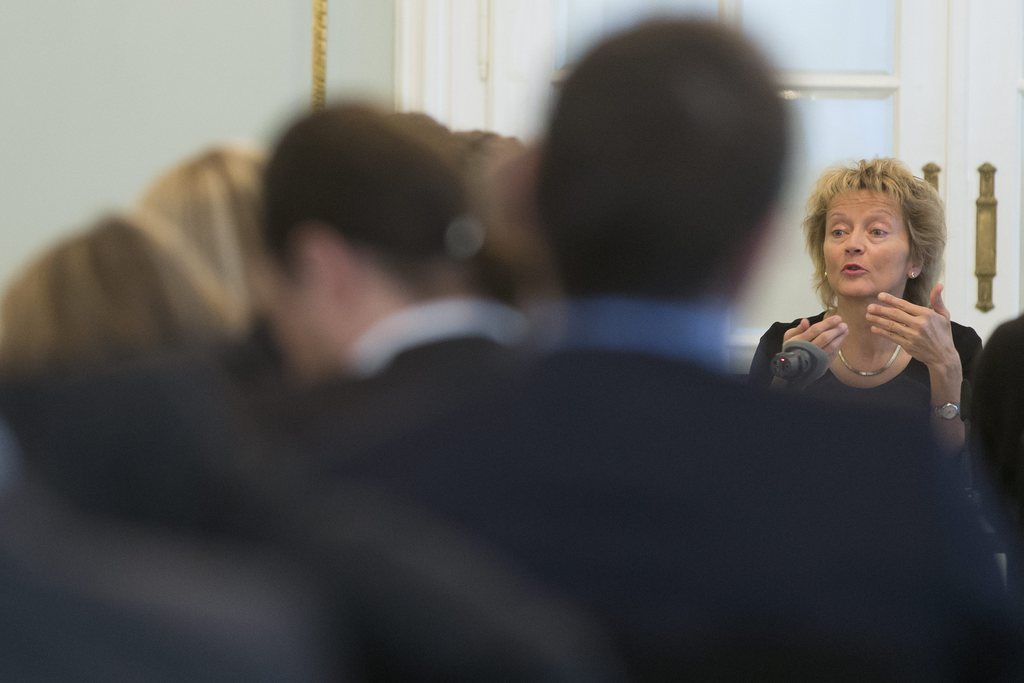Year-end interviews reflect broad Swiss interests

On the last Sunday of 2012, Swiss newspapers presented interviews with a range of newsmakers from government, public relations, business, and sport, demonstrating that the banking crisis – while omnipresent – wasn’t the only topic of interest this year.
Anticipating the lack of news that tends to accompany the end-of-year holidays, weekend versions of the major newspapers managed to find a range of interview partners to help bring the year to a colourful close.
European Union
The SonntagsZeitung focused on Switzerland’s relations with the European Union, running an interview with EU Commissioner Viviane Reding, originally of Luxembourg, who is European Commissioner for Justice, Fundamental Rights and Citizenship.
Reding said that Switzerland must realise that every third franc it earns can be credited to trade with the EU. “We are finished with bilateral treaties. We are standing at a crossroads,” she said. “Does Switzerland want to be a part of the market or not? If you don’t want to, then you don’t have to adopt any laws. If you want to take part, there are rules.”
This attitude raised the hackles of the president of the Radical Party, Philipp Müller. “We haven’t reached the end of the bilateral route, but it’s time for Switzerland to stop marching,” he said in a separate article in the SonntagsZeitung. “If Switzerland would remain steadfast, we would send a strong signal,” he said.
The editor-in-chief of the newspaper, Martin Spieler, commented in an editorial that Switzerland is “hyperventilating” in response to the EU’s latest demands. “But there is absolutely no reason to rush. At the moment the EU has much bigger problems than its relations with Switzerland.”
A further perspective on relations with the EU was offered by outgoing Swiss President Eveline Widmer-Schlumpf. Interviewed in the tabloid SonnntagsBlick, she claimed that “without Switzerland, the Euro crisis would be much worse.”
Widmer-Schlumpf, who had been strongly criticised by the Radical Party’s leader in December for hinting at Switzerland’s willingness to discuss an information exchange with Brussels over banking data, said she hadn’t proposed an automatic transfer. “There are various ways to exchange information. These will need to be discussed.”
The Swiss image
The French-language newspaper Le Matin Dimanche touched on Switzerland’s difficult year in an interview with Nicolas Bideau, director of Presence Switzerland. “People abroad have two completely different views of Switzerland,” Bideau said. One is a result of the media’s portrayal of the banking crisis, and the other is pro-Swiss. Swiss tennis player Roger Federer “remains an unparalleled ambassador for Switzerland”, he acknowledged.
According to Bideau, there are other aspects of Switzerland that people abroad still are not truly aware of, such as its innovation, creativity and successes in the sciences. “It’s very paradoxical, because they contribute a great deal to our riches and our quality of life.” Switzerland, for example, is granted more patents than any other country in Europe, he said.
Breaking barriers
The success of a Swiss woman abroad was the focus of a profile in Zurich’s NZZ am Sonntag. Iris Bohnet, a professsor of economics at the renowned and highly competitive Harvard University in the United States, is also one of only two women to serve as academic dean of the Harvard Kennedy School, a “melting pot” for elite international students interested in careers in politics, public affairs, and global organisations. The school’s motto is “Ask what you can do” to make a difference in the world. Bohnet believes that research must be relevant to society. “I first learned that at Harvard. This awareness didn’t exist in Switzerland,” she says.
Bohnet, who also recently joined the board of directors of Credit Suisse and is a consummate career woman, acknowledges that family support is crucial. “It’s unsatisfactory that successful women have to say it at every turn, but that’s the way it is: having the right partner is the most important factor in the career of a woman.”
“Well-rounded” citizens
Educating Swiss society was a main topic discussed by Economics Minister Johann Schneider-Ammann in an interview with Der Sonntag. As of January 1, 2013, Schneider-Ammann will also take over the education ministry. After 97 years the department will receive a new name: the Ministry of Ecomomics, Education and Research.
The new emphasis of the ministry will be on developing a society that offers opportunities and takes advantage of synergies. Education creates “well-rounded, responsible, interested, socially engaged people,” said Schneider-Ammann, and this, regardless of whether an academic or a vocational path is followed.
The minister plans to show young people that education is forward-looking, and to introduce children – particularly girls – to disciplines like mathematics and technology as early as kindergarten.
Emotion and inspiration needed
Finally, as Swiss residents headed for the ski resorts to enjoy a break from work and education, the SonntagsZeitung featured an interview with Gian Gilli, sport director of Swiss Olympic and head of the committee Olympic Winter Games Graubunden.
Gilli said that the highlight of 2012 for him was returning from the Summer Olympics in London with 102 healthy athletes and 50 support staff, although clearly “As an athlete I want to win and we didn’t attain our goals there.”
Asked what he thought of the Swiss ski team’s current slump, the former chief of high-performance sports for Swiss Ski said the team’s problems are “extremely painful”. Gilli questioned whether it makes sense to concentrate on 15-20-year-old athletes, in skiing or any other Swiss sport.
Many Swiss sports are struggling to find and keep talented athletes. “We know how much value high-performance sports have in Switzerland,” he said, presumably with a hint of sarcasm.
The chance to bolster the Swiss sporting scene is one reason Gilli is now traveling around the ski resorts of Switzerland. As head of the committee to propose a Swiss candidacy for the 2022 Winter Olympic Games, Gilli believes not only the athletes but also canton Graubünden would have much to gain. “This is an event that can generate unvbelievable emotions and inspiration,” he said, “an event that creates perspectives for youth as well as creating jobs.”
Whether the residents of canton Graubünden will vote on March 3 in favour of a candidacy remains to be seen. Meanwhile, a week after the end of the world was avoided, life in Switzerland continues. And the media will continue to bring it to you.

In compliance with the JTI standards
More: SWI swissinfo.ch certified by the Journalism Trust Initiative


You can find an overview of ongoing debates with our journalists here. Please join us!
If you want to start a conversation about a topic raised in this article or want to report factual errors, email us at english@swissinfo.ch.